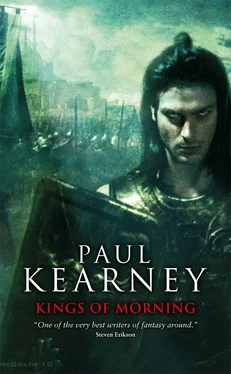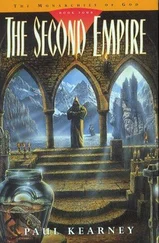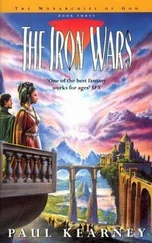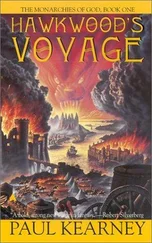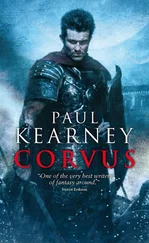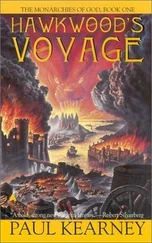Paul Kearney - Kings of Morning
Здесь есть возможность читать онлайн «Paul Kearney - Kings of Morning» весь текст электронной книги совершенно бесплатно (целиком полную версию без сокращений). В некоторых случаях можно слушать аудио, скачать через торрент в формате fb2 и присутствует краткое содержание. Жанр: Фэнтези, на английском языке. Описание произведения, (предисловие) а так же отзывы посетителей доступны на портале библиотеки ЛибКат.
- Название:Kings of Morning
- Автор:
- Жанр:
- Год:неизвестен
- ISBN:нет данных
- Рейтинг книги:4 / 5. Голосов: 1
-
Избранное:Добавить в избранное
- Отзывы:
-
Ваша оценка:
- 80
- 1
- 2
- 3
- 4
- 5
Kings of Morning: краткое содержание, описание и аннотация
Предлагаем к чтению аннотацию, описание, краткое содержание или предисловие (зависит от того, что написал сам автор книги «Kings of Morning»). Если вы не нашли необходимую информацию о книге — напишите в комментариях, мы постараемся отыскать её.
Kings of Morning — читать онлайн бесплатно полную книгу (весь текст) целиком
Ниже представлен текст книги, разбитый по страницам. Система сохранения места последней прочитанной страницы, позволяет с удобством читать онлайн бесплатно книгу «Kings of Morning», без необходимости каждый раз заново искать на чём Вы остановились. Поставьте закладку, и сможете в любой момент перейти на страницу, на которой закончили чтение.
Интервал:
Закладка:
Rictus stared at him. ‘What do you mean?’
‘I mean he has you in his spell, like half the army. If he told you to advance on the gates of hell, you’d start planning the route.’
‘That’s horseshit and you know it.’
Fornyx shrugged, and tugged his worn scarlet cloak tighter about his shoulders. In the failing light, his narrow, pointed face seemed vulpine, especially when the distant flames caught his eyes.
The two men stood leaning on their spears atop a low tell midway between the burning city behind them and the head of the marching columns farther east. Further down the slope a body of spearmen, several centons strong, stood with their shields resting against their knees in the age-old posture of the waiting soldier. They, too, were cloaked in scarlet, and one among their number held a banner, somewhat ragged, and hard to make out with the fading of its colours. It might have carried the image of a canine head.
‘Two days to the mountains, at this pace,’ Fornyx said in a lighter tone. ‘You’ve been through the Korash, of course.’
‘I have.’ It was in the Korash Mountains that the remnants of the Ten Thousand had finally fallen apart. They had split into competing factions, and then the winter had swooped in on them, and with the snow had come the Qaf.
It was in the Korash that Rictus of Isca had been voted leader of the Ten Thousand, except that there had been nowhere near ten thousand left of them at that point.
Rictus raised his head and looked at the high land to the east, that rampart of stone and snow, and something like a shiver went down his spine, the chill wind of his memories.
It would be different this time — he knew that. They were not a hunted band of starving men, but a mighty army, well-supplied and, above all, united.
And they would stay united.
‘Corvus has been giving us orders for long enough now that you should know what he’s about,’ he said to Fornyx. ‘It does no good questioning his intentions.’
I don’t piss and moan in front of the men — you know that,’ the other retorted. ‘Only to a select friend or two, those who have known me for somewhat longer than Corvus has.’ He walked away, descending the slope, using his spear as a staff.
Rictus almost called him back, but thought better of it. Fornyx would never do more than tolerate Corvus, and he could never think of the strange, brilliant youth who led them as his king. He was here because Rictus was here, and perhaps because he knew no other life.
There had been a time, back after Machran, when it might have been different. Andunnon was thriving; the quiet valley where Rictus had once made a home was risen from its ashes. Philemos lived there now, married to Rictus’s beautiful daughter Rian, and there were children in the house by the river. His grandchildren.
But every time Rictus had tried to settle there, to forswear the scarlet, the image of his own wife had swamped the joy in the place. Poor, wretched Aise, the only woman Rictus had ever loved, whose life had ended in torment and suicide.
Because of him.
I have too many ghosts, he thought. Even Fornyx does not truly understand that.
He remembered his own father, as fine a man as he had ever known, slaughtered after the fall of Isca. Another home in flames around him.
For Rictus, the hearth of a good home brought back too many evil pictures to his mind. Whereas in the camp of an army he felt at ease, and when his soldiers died it was something expected, even fitting. And he knew that in this thing, he and Corvus were the same. The King of the Macht preferred a tent in the open to the halls of a palace, and he was never happier than when surrounded by comrades in arms, all of them bound to a single purpose — that dream of fire which had launched him on his extraordinary career.
It was this which drove him, as much as any lust for conquest. He was afraid of what life would be at the end of the final campaign.
That is the frightening thing, Rictus thought — to get to the end of it all, and find it meant nothing — any of it.
Better to keep marching.
For the older men in the army the very concept of a king was still strange, a Kufr idea. It helped that Corvus had no sense of ceremony about him, and had acquired no airs or graces since his crowning in Machran all those years ago, in the wake of the great siege. He was as like to be found sharing rough wine with a bunch of conscripts in the evenings as he was to be in the royal tent.
But he was their king — that much he had earned — and Rictus, thinking on it, found himself almost surprised at the sense of protectiveness he felt towards the young man who had conquered them all.
I never had a son, and I will never have one, now. But if I could have had one like Corvus, I would have been content.
That night, they trooped into Corvus’s great tent, stinking of smoke and blood, their feet blackened with soot and their faces smeared with it. The long trestle table was cleared of maps and pointers and inkwells and the paraphernalia of military planning, and the high officers of the army sat in their sweat-sodden scarlet chitons and passed jugs of wine up and down, drinking from them in turn like brothers at a wedding.
His Marshals, Corvus called them, and he had formalised the rank within the army. Each of these men commanded many thousands, and all of them had shed blood together. Each was as powerful as a king unto himself.
They were all Macht save one, all veterans of many battles, and yet most of them were young, though Corvus was still the youngest of them all.
Rictus sat with Fornyx on one side and the Kufr Ardashir on the other. Save for Valerian, who was now second of the Dogsheads, these were perhaps his closest friends, if one did not count the King himself. Fornyx had fought at Rictus’s shoulder for going on twenty-five years, and Ardashir had saved his life at the siege of Machran.
Further along the table was dark Druze of the Igranians, who never seemed to lack a smile or a cup — usually with dice in it, not wine. He was fuller-faced than he had once been, but he could still run down a horse. It was his men who had been first into Ashdod after the walls were breached. The ensuing slaughter did not seem to have dimmed his humour.
One-eyed Demetrius, almost as old as Rictus, led the conscript spears, and was a harsh, unsmiling man who was one of the finest trainers of men Rictus had ever known. He could take a snivelling boy and make a soldier of him, in a process he had refined over the years into a model of efficiency and brutality. He was lame now, though, the legacy of a wound he had taken at the Haneikos River. He had stood in the water there and held the line while the river ran red around his knees.
Teresian sat beside him, an unlikely other half. He was a tall strawhead that a stranger might have said was Rictus’s close kin, so similar did they seem. He commanded the Shieldbearers, those spearmen who had volunteered for the army and were in the ranks for life, because they found that the life suited them.
In a previous era they would have been mercenaries, but since the world had changed they were now part of the standing army that Corvus kept in being at all times. Before his coming, a city might have maintained a professional cadre of a centon or two to train its citizens. Since the Macht had acquired a king and become a nation, that had all changed. The Shieldbearers were kept ten thousand strong at all times. Even Rictus did not know if, in this, Corvus had been inspired by the original Ten Thousand, or by the Honai of the Great King.
The last of the Marshals was a small, round-shouldered but heavily muscled man with a bald head. He did not seem like a soldier, and in fact at one time he had been Corvus’s chief scribe. This was Parmenios. He had a genius for building and engineering projects, and was even more ingenious at engineering their destruction. He was master of the siege train, which since Machran had become a permanent part of the army’s establishment.
Читать дальшеИнтервал:
Закладка:
Похожие книги на «Kings of Morning»
Представляем Вашему вниманию похожие книги на «Kings of Morning» списком для выбора. Мы отобрали схожую по названию и смыслу литературу в надежде предоставить читателям больше вариантов отыскать новые, интересные, ещё непрочитанные произведения.
Обсуждение, отзывы о книге «Kings of Morning» и просто собственные мнения читателей. Оставьте ваши комментарии, напишите, что Вы думаете о произведении, его смысле или главных героях. Укажите что конкретно понравилось, а что нет, и почему Вы так считаете.
